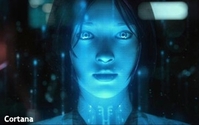Commentary
Microsoft Cortana To Give Bing Voice
- by Laurie Sullivan , Staff Writer @lauriesullivan, February 21, 2014
 A recent Microsoft Windows Phone 8.1 software development kit (SDK) leak reveals many changes to the next version -- and one in particular that should change the game for Bing by
making it more competitive with Apple and Google. One of the main updates is a feature we've been hearing about for about a year -- Cortana, a digital personal assistant named after
Microsoft's Halo video game series.
A recent Microsoft Windows Phone 8.1 software development kit (SDK) leak reveals many changes to the next version -- and one in particular that should change the game for Bing by
making it more competitive with Apple and Google. One of the main updates is a feature we've been hearing about for about a year -- Cortana, a digital personal assistant named after
Microsoft's Halo video game series.
The artificial assistant will tap into location-based data, behavior on Bing and social networks, as well as personal information and reminders stored on the phone, per The Verge. It will also have a Notebook privacy feature that allows users to control the information that gets shared and accessed by Cortana.
Cortana will pull the information from connected social networks, historic search queries, alerts, reminders and more, providing suggestions and recommendations for a variety of things like restaurants, products, and services
Microsoft has refused numerous requests to discuss that one specific technology. One reason Cortana could become the reason consumers, especially fans of Halo, choose a Windows phone. Cortana provides the narrator for the Halo video game series. She narrates the back-story and tactical information to players, and could do the same for Window Phone 8.1 users based on available data.
The backend support for Microsoft's virtual assistant will no doubt be the company's knowledge engine database, Satori. It will become one of the world's largest data repositories, along with Google's Knowledge Graph, a comparable data base built by Yahoo, and other repositories used by government and law enforcement built by a handful of PayPal alumni and Stanford computer scientists at Palantir Technologies.
In 2012, Stefan Weitz, director at Microsoft Bing, spoke with MediaPost about the future of search. He described the content in the research paper became "Anticipatory Search: Using Context to Initiate Search," where pre-search context becomes natural to predict content the user will seek before they have even specified a search query.
It was about two years ago that Weitz told Media Magazine we will enter a world where content serves up on desktop computers and mobile devices without typing words into a search box, because engines will put more emphasis on natural language. We now know that support comes from artificial intelligence like Cortana.
Real-time media and social data create the new Web, replacing back-linked documents and anchor text that send signals to search engines. Weitz said in the future search relies on actions like Twitter tweets or acknowledging a calendar initiation on your mobile phone. Guess what? The future is here.



